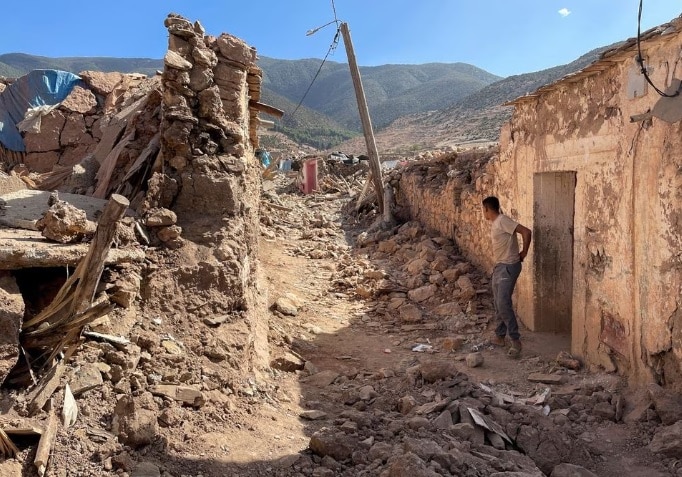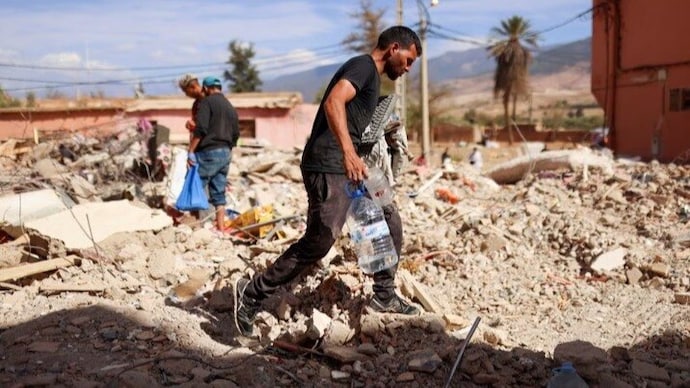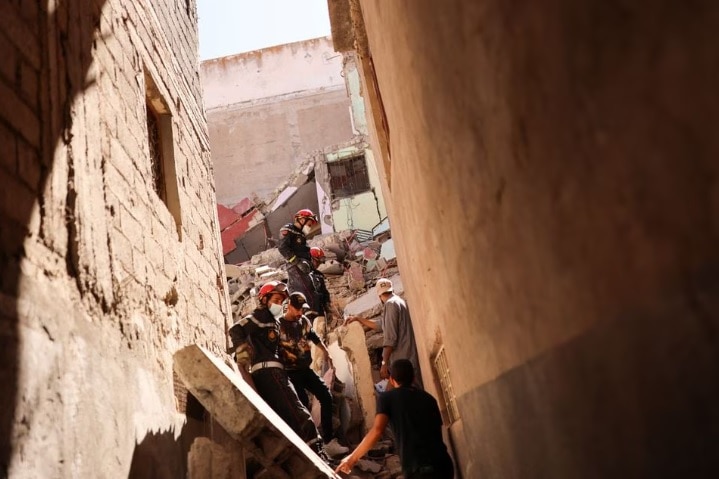
Morocco earthquake death toll rises to over 2,100 as survivors struggle for aid
The death toll in Morocco's deadliest earthquake in over six decades rose to 2,122 as residents who survived the tragedy struggled to get food, water and shelter.

Survivors of Morocco's deadliest earthquake in more than six decades struggled to find food, water and shelter on Sunday (local time) as the search for the missing continued in remote villages. The death toll rose to more than 2,100 and it was likely to rise further.
Many people were spending a third night in the open after the 6.8 magnitude quake hit late on Friday. Relief workers face the challenge of reaching the worst-affected villages in the High Atlas, a rugged mountain range where settlements are often remote and where many houses crumbled.
The death toll climbed to 2,122 with 2,421 people injured, state TV reported. Morocco said it may accept relief offers from other countries and will work to coordinate them if needed, according to state TV.
The damage done to Morocco's cultural heritage became more evident as local media reported the collapse of a historically important 12th-century mosque. The quake also damaged parts of Marrakech old city, a UNESCO World Heritage site.
In Moulay Brahim, a village 40 kilometres south of Marrakech, residents described how they dug the dead from the rubble using their bare hands. On a hillside overlooking the village, residents buried a 45-year-old woman who had died along with her 18-year-old son. A woman was sobbing loudly as the body was lowered into the grave.
As he retrieved possessions from his damaged home, Hussein Adnaie said he believed people were still buried in the rubble nearby.
"They didn't get the rescue they needed so they died. I rescued my children and I am trying to get covers for them and anything to wear from the house," Adnaie said.
Yassin Noumghar, 36, complained of shortages of water, food and power, saying he had received little government aid so far.
"We lost everything, we lost the entire house," Noumghar said. "We just want our government to help us."
Later, sacks of food were unloaded from a truck which local official Mouhamad al-Hayyan said had been organised by the government and civil society organisations.
Twenty-five bodies had been brought to the village's small clinic, according to the staff.
With many homes built of mud bricks and timber or cement and breeze blocks, structures crumbled easily. It was Morocco's deadliest earthquake since 1960 when a quake was estimated to have killed at least 12,000 people.
In the badly hit village of Amizmiz, residents watched as rescuers used a mechanical digger on a collapsed house.
"They are looking for a man and his son. One of them might still be alive," said Hassan Halouch, a retired builder.
The team eventually recovered only bodies.
The army, mobilised to help the rescue effort, set up a camp with tents for the homeless. With most shops damaged or closed, residents struggled to get food and supplies.
"We are still waiting for tents. We haven't had anything yet," said Mohammed Nejjar, a labourer who was folding his blanket in a makeshift shelter constructed with bits of wood. "I had a little food offered by one man but that's all since the earthquake. You can't see a single shop open here and people are frightened to go inside in case the roof falls down."
The quake's epicentre was 72 kilometres southwest of Marrakech, a city beloved by Moroccans and foreign tourists for its medieval mosques, palaces and seminaries richly adorned with vivid mosaic tiling amid a labyrinth of rose-hued alleyways.
The government said on Sunday it had set up a fund for those affected by the earthquake. The government also said it was reinforcing search-and-rescue teams, providing drinking water and distributing food, tents and blankets. The World Health Organisation (WHO) said more than 3 lakh people were affected by the disaster.
FOREIGN AID
Spain said 56 officers and four sniffer dogs had arrived in Morocco, while a second team of 30 people and four dogs was heading there. The UK said it was deploying 60 search-and-rescue specialists and four dogs on Sunday, as well as a four-person medical assessment team. Qatar also said its search-and-rescue team departed for Morocco.
US President Joe Biden expressed his "sadness about the loss of life and devastation" caused by the quake.
"We stand ready to provide any necessary assistance to the Moroccan people," Biden told a news conference in Hanoi, Vietnam.
A US official said a small team of disaster experts dispatched by the United States arrived in Morocco on Sunday to assess the situation.
France said it stood ready to help and was awaiting a formal request from Morocco.
Other countries offering assistance included Turkey, where earthquakes in February killed more than 50,000 people. By Sunday, the Turkish team had not yet departed.
"The next two to three days will be critical for finding people trapped under the rubble," Caroline Holt, global director of operations for the International Federation of Red Cross and Red Crescent Societies (IFRC), told Reuters.
Holt said the international aid system has been waiting for an invitation from Morocco to assist, adding this was not necessarily unusual as the government assesses needs.
Pope Francis offered prayers and solidarity for the victims.
Morocco has declared three days of mourning and King Mohammed VI called for prayers for the dead to be held at mosques across the country.

